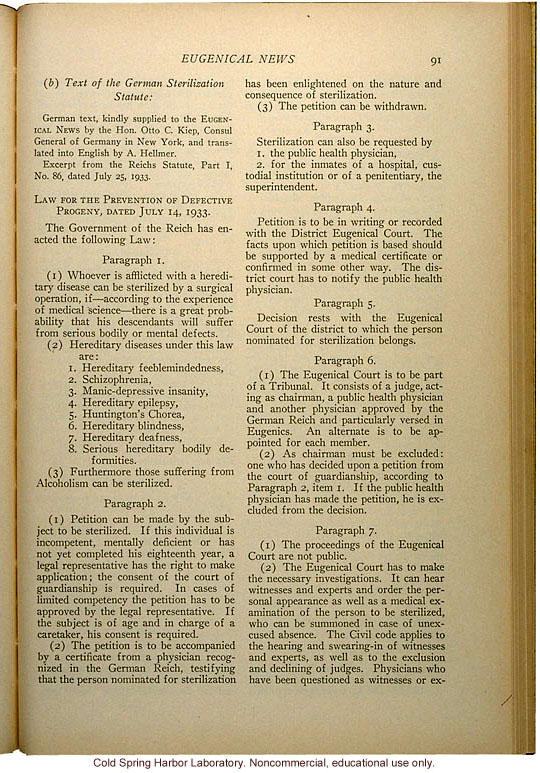"Eugenical Sterilization in Germany," Eugenical News (vol. 18:5), commentary and full translation of the German sterilization statute of 1933 (2)

"Eugenical Sterilization in Germany," Eugenical News (vol. 18:5), commentary and full translation of the German sterilization statute of 1933 (2)
1903. Eugenical News 91 (b) Text of the German Sterilization Statute: German text, kindly supplied to the Eugenical News by the Hon. Otto C. Kiep, Consul General of Germany in New York, and translated into English by A. Hellmer. Excerpt from the Reichs Statute, Part I, No. 86, dated July 25, 1933. Law for the Prevention of Defective Progeny, dated July 14, 1933. The Government of the Reich has enacted the following Law: Paragraph I. (I) Whoever is afflicted with a hereditary disease can be sterilized by a surgical operation, if --- according to the experience of medical science - there is a great probability that his descendants will suffer from serious bodily or mental defects. (2) Hereditary diseases under this law are: 1. Hereditary feeblemindedness, 2. Schizophrenia, 3. Manic-depressive insanity, 4. Hereditary epilepsy, 5. Huntington's Chorea, 6. Hereditary blindness, 7. Hereditary deafness, 8. Serious hereditary bodily deformities. (3) Furthermore those suffering from Alcoholism can be sterilized. Paragraph 2. (I) Petition can be made by the subject to be sterilized. If this individual is incompetent, mentally deficient or has not yet completed his eighteenth year, a legal representative has the right to make application; the consent of the court of guardianship is required. In cases of limited competency the petition has to be approved by the legal representative. If the subject is of age and in charge of a caretaker, his consent is required. (2) The petition is to be accompanied by a certificate from a physician recognized in the German Reich, testifying that the person named for sterilization has been enlightened on the nature and consequence of sterilization. (3) The petition can be withdrawn. Paragraph 3. Sterilization can be requested by I. the public health physician, 2. for the inmates of a hospital, custodial institution or of a penitentiary, the superintendent. Paragraph 4. Petition is to be in writing or recorded with the District Eugenical Court. The facts upon which petition is based should be supported by a medical certificate or confirmed in some other way. The district court has to notify the public health physician. Paragraph 5. Decision rests with the Eugenical Court of the district to which the person nominated for sterilization belongs. Paragraph 6. (I) The Eugenical Court is to be part of a Tribunal. In consists of a judge, acting as chairman, a public health physician and another physician approved by the German Reich and particularly versed in Eugenics. An alternate is to be appointed for each member. (2) As chairman must be excluded: one who has decided upon a petition from the court of guardianship, according to Paragraph 2, item 1. If the public health physician has made the petition, he is excluded from the decision. Paragraph 7. (I) The proceedings of the Eugenical Court are not public. (2) The Eugenical Court has to make the necessary investigations. It can hear witnesses and experts and order the personal appearance as well as a medical examination of the person to be sterilized, who can be summoned in case of unexcused absence. The Civil code applies to the hearing and swearing-in of witnesses and experts, as well as to the exclusion and declining of judges. Physicians who have been questioned as witnesses or ex- [end]
- ID: 11818
- Source: DNALC.EA


